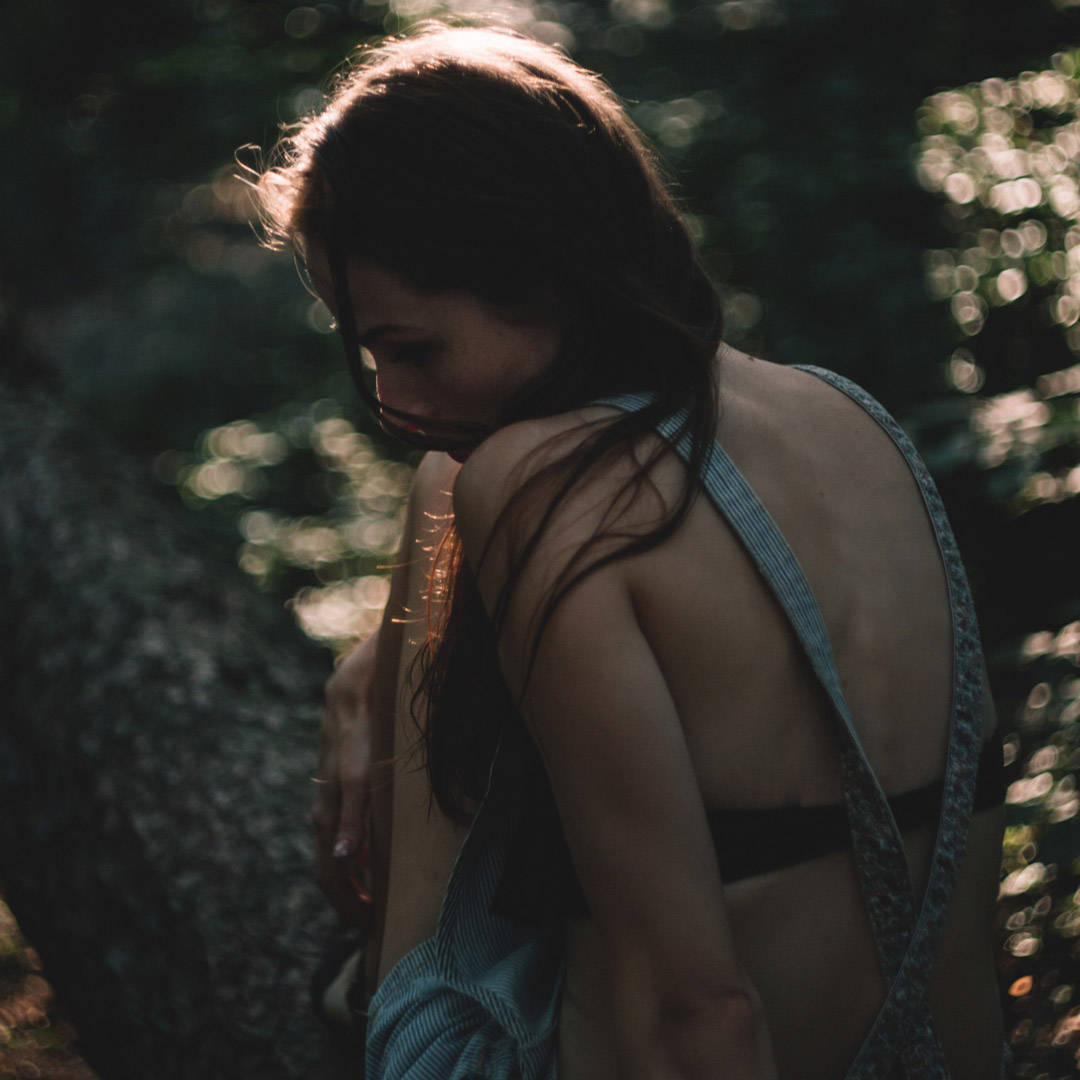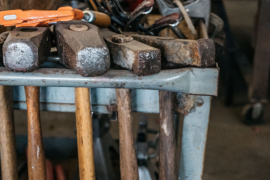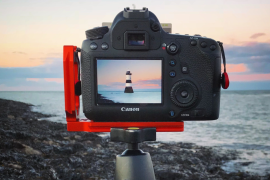WE FIND IT HUNCHED ON A ROOT OF A CYPRESS TREE at the edge of the bayou around eight o’clock. Dad checks the crab traps for the third time today. Its bright red eyes stand out in the almost pitch black swampy darkness. The root it’s standing on is bulbous, white, and sticks up from the water. Cam thinks it’s a dog and begs us to take it home. He’s six years younger than me, only eight, and he sure knows how to charm Dad. He holds a large branch that he uses to fish litter out of the water.
There aren’t any crabs but Cam finds an empty Lays bag to throw away. Dad catches crabs and is a part time cashier at Miles General Store on I-10 by the sandy area on an offshoot of Lake Ponchartrain. They go home to get another steel trap. I sit with the thing, only able to see its red eyes, a slight outline of tree roots and a few stars reflecting on water.
We sit silently until Dad and Cam come back. Cam maneuvers in front of it with the cage and I creep behind it, the bayou water soaking my legs from my knees down. Dad has bad vision and stays on the ground. Cam opens the trap and puts it on top of the creature. There isn’t any resistance and we turn the crate sideways to close it. With creature in tow, we return home.
Cam already has a name for him.
“Where are we gonna keep Lucky?” he asks.
“Just move some of these posters out the way,” Dad says.
They put the cage down, a rusty silver contraption against the wooden walls that line our shed. The walls are like a sideways dock; they’re made from barely sanded planks with rows of identical narrow slots in between that termites sometimes crawl through.
Dad and Cam know my canvases don’t mean anything. I haven’t painted since Abigail died. We were thirteen when we started dating. When she was alive and I said I loved her, everyone told me I was too young to know love. Now everyone tells me “I’m so sorry, I know you two loved each other.”
Dad thought it was great I already had a girlfriend. Her death hit him hard too, and Cam who had just gotten to know her. Before that, the only person Cam met who died was Grandma Louise, Dad’s mother. When they found out she’d been killed after being hit on her bike, I could see grief in their eyes.
It’s not that I don’t want to paint. I can’t. Every time I try, I’m a three year old with nothing to show for my new work except misguided streaks of different colors. When I try, I dip the brush in paint and hold it above the canvas. When I finally get enough courage to put the brush down, I can barely scribble let alone draw a face.
my canvases don’t mean anything. I haven’t painted since Abigail died.
Lucky stares at us with a red glare.
“It’s hungry,” Cam says. He slides him piece of beef jerky. We stand there, looking expectantly, its eyes fixated on us, shining against his brown fur. I think if he eats it, that’ll mean he accepts us. Finally, he sniffs around, and holding the beef jerky between two long pointed brown claws, he gnarls the snack with orange fangs. I feel my heart swelling like microwave popcorn. He eats manically, shredding the jerky in his mouth.
“I’ve never seen a dog with teeth like that,” Dad says.
“I’ve never seen a dog hold anything with hands,” I say.
“That’s not a dog. That’s a nutria. Look at it.” Cam says.
“You know I can’t see,” Dad says.
I stare at it and realize Cam’s right. The prickly brown fur. The bird-like hands, which like its long narrow tail are furless. It looks like an oversized brown rat. It makes eye contact with me, its red eyes concentrating like a homeless chess player I saw in Baton Rouge, but opening up as if expressing a layer of trust.
“I heard you get a dollar for every one of em you kill,” Cam says.
“Y’all put it back in the water,” Dad says. “You made get the trap now y’all let it go.”
“Come help me with Lucky,” he says.
“Wait,” I say. I don’t know why, but I’ve grown attached to the thing.
It’s just Lucky and me in my cramped room. Outside I hear Dad and Cam talking about the monster truck show in Kenner Dad has tickets to. I’m sideways on my cot, and Lucky’s sitting in the cage, his laser-pointer red eyes the most vivid thing in the room. The sun’s setting, and only a little light shows through the slitted window at the tip of my bed. I take one of the canvases and put it on the easel in the corner of my room. I grab a few tubes of paint and a brush. I hear a soft banging sound and see Lucky chewing the bars of his cage. With his mouth closed, he looks harmless but his front teeth are gigantic and rectangular, stained orange because of all the bark he devours. I dip the brush and start moving it. The image of Abigail that has been in my head so long- her non-judgmental nervous green eyes, her black hair that went right past her shoulders, presents itself in front of me. We weren’t even together for a full year when she died. It was ten months and seventeen days. For the first time since her accident, I’m able to paint. I’m able to see her. The painting in front of me starts at her shoulders. She’s wearing a white silk dress, and her tan skin glows with my oil paints, the way it does in my memory.
It makes eye contact with me, its red eyes concentrating like a homeless chess player I saw in Baton Rouge.
In the elementary school I went to in Boutte Riveria, I learned that nutrias were introduced to Louisiana around the 30s by an Argentinian businessman wanting to turn a profit in the fur trade. A few nutrias managed to make their way into the wild. They adapted to the swamps and marshes easily, and started reproducing rapidly while devouring trees that keep the land together. They’ve been slowly destroying Louisiana’s wetlands. I walk to the marsh, cut a chunk of a cypress tree, and bring it back to Lucky.
I stay up until early morning as Lucky rattles about in the cage. I’ve had him for five days, and when I’m around him I get radiant energy and my ability to paint returns. I paint landscapes of hills and pastures that seem to be 1000 miles from Louisiana. Here, there are only flatlands. There aren’t hills for miles, only forests and wetlands. I paint Abigail more. We’re standing together under a full moon. It’s dim, and I’m able to portray the moonshine glow off our skin. We’re standing on the edge of the bayou, our feet among the knotted cypress tree roots. It’s the only time I’ve painted an image of myself I like. I remember being interested in painting since I was a child. I loved painting animals, people, trees, objects, anything, even imagined villages with pale white houses and yellow straw roofs like in the three little pigs or a town in the Middle Ages.
When we finally got an art assignment in second grade, it was a self portrait. I struggled in front of the mirror for hours, contorting my face to find the right angles, but in the end it looked nothing like me. I paint the planet Earth, as if staring at a globe full on. One half of Earth I turn into Abigail’s face, her eyes blending with the green landmasses behind her. She was passionate about the environment the way I am about art. She convinced me to recycle paint tubes and got Cam to fish litter out of the bayou. When I finally turn the lights out, Lucky makes a sound. It’s a long honking mehhhh, similar to a cow or geese. I recognize the nighttime sound from the bayou, though I never knew the source was nutrias. I wait for him to do it again but the only noise is him moving about in the cage. As I’m drifting to sleep, I hear it again but I don’t know if it’s real or in a dream.
“You know that thing isn’t going to turn into a dog,” Cam says.
“Yeah, well you don’t have to walk a nutria.” I didn’t tell my father or him that I had several new paintings. The place is sparse: a gas stove that takes an hour to heat up, a flickering light, a few tattered beds, some traps, boxes, tools, and rope. I have a room that’s about the size of our kitchen, eight by eight feet, as does my dad. Cam sleeps on a mattress in the main room, where we’re standing. The only thing on the walls is a copper colored crucifix hanging in the kitchen. My father used to encourage me to hang up a painting or two, but I never felt like I had one good enough. I’m holding the painting of Abigail and me, and using a shoelace I tape to the top, I hang it on a bent-nail sticking out of the wall. Cam looks at it for a second.
“You know,” he says. “I think art makes the whole place look better.”
It’s the third week of August and I’m starting my second year at Elijah Winters Math and Science High School. It’s a boxy maroon colored school not far off the exit on the interstate, and we can still hear giant trucks throughout the day nearby. There aren’t any trees, there’s no shade outside, and most of the air conditioners in the building don’t work. I want to bring Lucky with me. It’s been two week since we got him. He’s about three inches taller, and his fangs look more defined, orange like the inside of a yam. I make a collar and leash. I open the cage and he runs over my red fuzzy carpet, trying to hide in the corner. When I approach him, he goes to the other side of the room. Every time I go near him he runs away, his rope like black rat tail sliding behind him. Finally I call for Dad and Cam to help me get Lucky back in the cage. The three of us run around and finally Dad gets a crate and drops it on him. I scream, but Lucky’s alright- just a little dazed. I gently put him back. It’s the first time I’ve touched him- for fear of him biting me. He’s still a little hazy so there’s no resistance as I usher him in. I decide it’s better to leave him at home.
“Do you think resurrection is possible?”
I’ve been seeing the school counselor, Mrs. Humphries ever since she pulled me out of class and told me a highway cleanup worker found Abigail’s body tangled in some trees about fifteen yards from the interstate, her bike split in half. Mrs. Humphries called my dad but he couldn’t come in because he was at the store. I could tell she didn’t think of me as an adult. While I stared right past her at the beige rectangular blocks making up the walls, she droned on about birds flying from a nest. How some birds make it all the way to the tropics and others fall into the water.
I only have a few meetings with her left.
“How was your break?” she asks. It’s my first day of class, and I miss study hall to talk to her. She’s a stout soft faced woman with red hair and light blue eye shadow. I find her attractive, like she could be an actress in motherly roles.
“It was alright. I found a nutria.”
“A nutria? I hope you didn’t touch it.”
“It’s in my room,” I say. “I think it’s Abigail.”
Mrs. Humphries leans forward though her concerned wrinkled brown eyes are unmoving. “Abigail? In what way?”
“Before we found Lucky- the nutria, I was so empty. Once we found it, it’s like all of my feelings of grief disappeared.”
“I see,” she says.
“I really think it might be Abigail. In a different form.”
“This is what you need to do,” she tells me. “You need to put the nutria back in the bayou.”
“Do you think resurrection is possible?”
That night I dream Abigail and I are standing in a swamp. There is bright green algae on the dirty water. Bulbous cypress tree roots shoot up from the ground as moss dangles from the branches. We walk across, not like they say Jesus walked on top of water; we walk through the muddy enclave waist deep. The sky is filled with intangible stars, and we stare up as we wade through. I turn and Abigail’s no longer beside me. I’m standing next to my school, and Cam and Dad are with me. They’re not saying anything, just standing against the red wall as the sun sears us.
“Where’s Lucky?” I say. I’m holding a leash that’s empty. Cam’s holding a shoebox. I look in. Lucky’s carcass is inside, his tail wrapped around his front. Except he doesn’t have any fur. Hairless, gray, and shriveled, he looks pruned, like a one hundred year old who’s been in a tanning booth all day.
Mrs. Humphries stands next to Cam.
“He died because the sun is too bright,” she says. “Nutrias only come out when its dark.”
“No!” I yell, and run over to the box, but it fades away and I see two glistening red lights.
I’m gazing at Lucky’s bright stare from my cot in the darkness of my room, my cot soaked with sweat.
Sometimes Abigail would visit me in the afternoon. Dad didn’t like it when she’d leave late. Sometimes she’d even come at night, when she’d have trouble sleeping and want to see me.
“I don’t like you riding round here when its dark,” he’d say. “At night time you can’t see anything ‘cept the lights on a Mack truck. I can’t drive you myself cause I don’t have a car. I can barely see. Craig-Michael gives me rides to the general store.”
She knew she was always welcome here and a lot of times I think she was on her way here when she died. Where else would she be going on the Interstate when it’s dark? Everyone tells me it’s not my fault, that Abigail loved riding her bike, especially at night.
I wonder if each nutria has its own personality or if they all think and feel the same. And I wonder whether the bayou, the cypress trees, and the nutria care if Abigail died. I think maybe the trees don’t see the difference between nutria and humanity. To them, we’re both an invasive species, gnawing on the roots until everything unravels.
Edward Denegre is a freelance writer living in Brooklyn, New York. He graduated with a Bachelor’s of Fine Arts in Creative Writing from Pratt Institute.
Like what you’re reading? Get new stories sent to your inbox every Monday.
Drop your email below to start >>>




